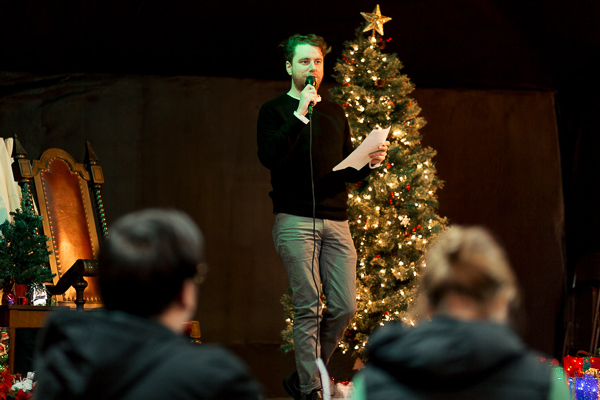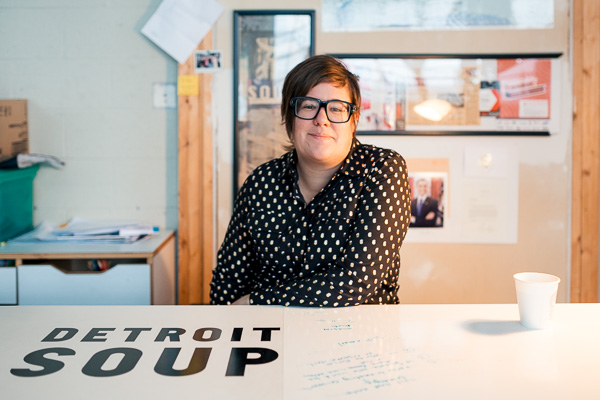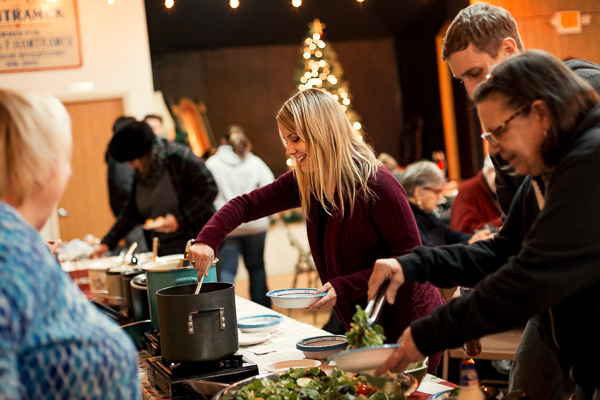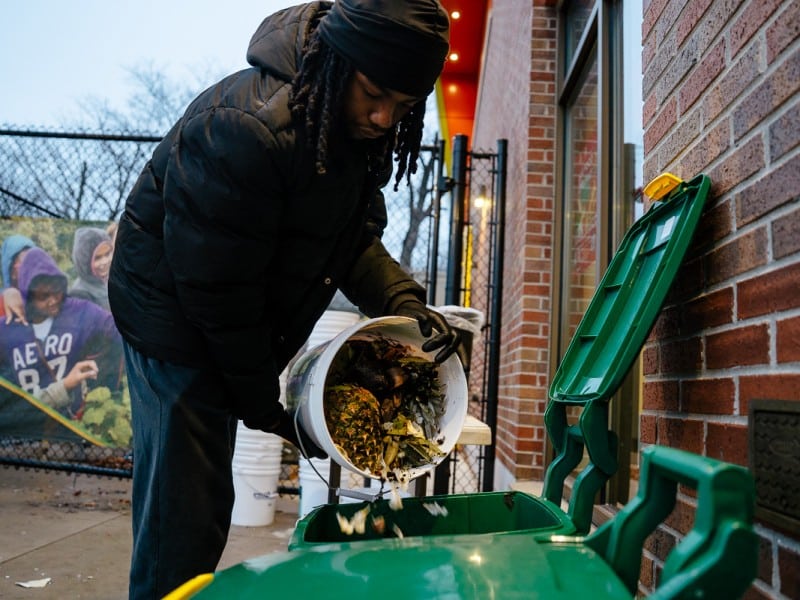Every dollar counts: Detroit SOUP and the impact of micro-grants
$5 at a time, Detroit SOUP and its affiliates have sponsored over 150 dinners and raised more than $132,600 for local causes.
Detroit SOUP has come a long way since its humble beginnings in February 2010, when a group of friends first got together for a meal in a loft above the Mexicantown Bakery to brainstorm about raising money for local projects. Inspired by the fundraising brunches of a Chicago research and arts organization called InCUBATE, they were interested in trying out a democratic experiment in community micro-granting, one that involved holding soup-centered dinners with a $5 admission and letting attendees vote on how to spend the proceeds.
At the time, they were just talking and breaking bread, but their conversation resulted in the organization’s earliest soup get-together that April. Several presenters pitched ideas, but ultimately those gathered chose photographer Justin Ames as SOUP’s first winner after hearing his proposal for a Rust Belt Architecture photo book. His prize? $110.
$110 might not seem like a lot, but dinner-by-dinner, the impact of the community-based micro-granting program has added up. Since April 2010, Detroit SOUP and its affiliates have sponsored over 150 dinners and raised more than $132,600 for local causes; these include endeavors like Rebel Nell, a social enterprise that employs disadvantaged women making graffiti jewelry, and Detroit Horse Power, a nonprofit dedicated to teaching youth how to train and care for horses.
Over the last few years, the micro-granting organization has also found a permanent home at the Jam Handy, an event space in Detroit’s New Center neighborhood. And in an effort to get more involved on a street-by-street level, it launched a series of Neighborhood SOUPs in Detroit and Hamtramck, which hold their own dinners independent of scheduled citywide SOUP events. Of the 11 Neighborhood SOUPs launched since 2013, all but the Downtown Detroit SOUP are still active.
The group’s work has also inspired others.
“A lot has changed, but nothing’s changed at the same time,” says Detroit SOUP director Amy Kaherl, reflecting on the past seven years. “It was an experiment and it still remains that, but now there’s 175 cities around the world that are starting to use the model we created.”
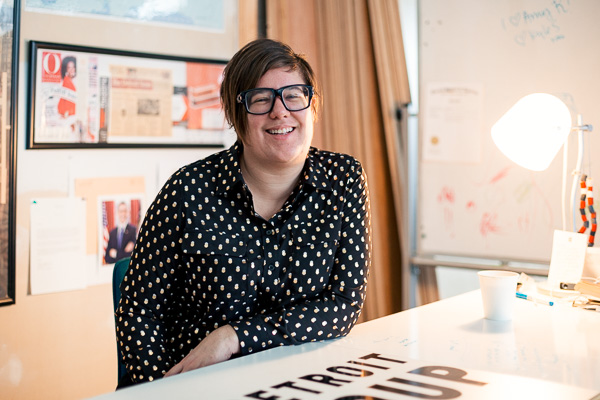
The basic idea behind Detroit SOUP is pretty simple. Attendees pay $5 for soup, salad, and the opportunity to vote to for one of four projects. The nature of these endeavors is pretty far-ranging: art, urban agriculture, social justice, social entrepreneurship, education, and technology have all been represented. Presenters are given four minutes to speak and afterwards audience members get a chance to ask questions. When that’s over, everyone gets a chance to eat, talk things over, and vote. At the end of the evening, whoever gets the most votes gets to take home all the money collected at the door.
So what kind of impact does SOUP have on local projects? Hamtramck SOUP, one of the organization’s neighborhood affiliates, attempted to answer that very question with a special celebration dinner at the P.L.A.V. Post #10 veteran’s clubhouse earlier this year. The event invited back past winners and gave them a chance to share their progress with community supporters.
Speakers at the celebration included representatives from Beds for Kids, the effort to save Hamtramck Disneyland folk art installation, Detroit Free Little Libraries and urban farmer Emily Staugaitis, who is in the process of establishing an apple orchard at Main and Carpenter in Detroit just north of the Hamtramck border.
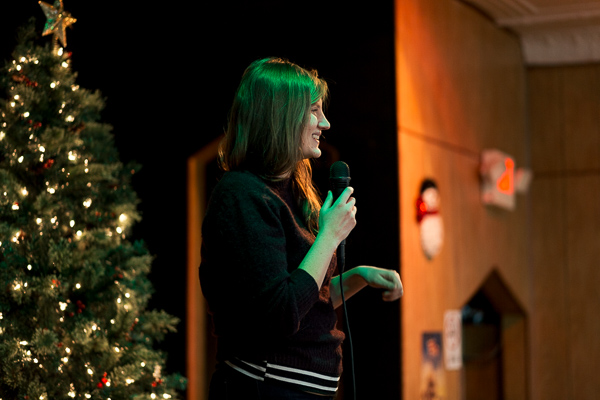
Staugaitis plans to plant 200 trees supported by a trellis system and use the project to teach local school children about where food comes from. So far, The Orchard, as the endeavor is known, has planted 10 apple trees, 200 strawberry plants, and several raspberry bushes.
She used the money to buy tools, including some for kids, and water catchment equipment. Not long after giving her presentation last May, a local supporter also donated two water tanks at the orchard to help get the project off the ground.
“It was really great to win,” says Staugaitis. “I think in addition to the financial support, the vote of confidence of having a lot of neighbors who care about this place say, ‘Yeah, that’s something I want to see,’ was a real vote of confidence.”
SOUP also gave her an additional boost in securing other grants.
“There’s a snowball effect in fundraising. Once you get a little bit of a leg up, it just keeps going,” she says. “So it helps to kind of leverage that and use it as evidence that other people think this is worth funding.”
Although Beds For Kids, a charity connected to the Recycled Treasures, is still having a trouble getting off the ground, Hamtramck SOUP’s funding gave the arts collective Hatch Art the resources it needed to make immediate repairs on Hamtramck Disneyland, and cover inspection and licensing costs, while it worked to secure further assistance for a more comprehensive restoration. And Detroit Little Libraries, a campaign dedicated to installing tiny book boxes in public places used the $800 it raised to purchase books geared towards several different cultures in recognition of Hamtramck’s ethnically diverse population.
At the event, organizers also shared the story of Genesis Soup Kitchen. Although the charity didn’t have a winning proposal, a generous attendee ended up donating $500 and a freezer full of beef to their cause after hearing them present at Hamtramck SOUP.
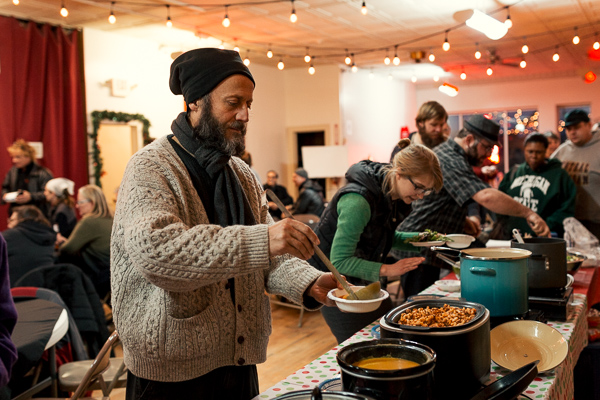
The current incarnation of Hamtramck SOUP has been meeting since 2013. Like the other neighborhood chapters, it gets support from a central Detroit SOUP nonprofit but is run autonomously by a board of neighborhood residents. So far, they’ve held 12 community gatherings and raised more than $7,900 for community projects. The money they’ve raised at individual dinners has ranged from $100 to $1000.
Hamtramck SOUP Chairperson Erik Mitchell is delighted with the progress their winners have been making. And he thinks the value of the dinners go far beyond the monetary assistance.
“We get people to come together,” he says.”It provides a neutral space to talk and see the positive things that people are doing and how they can move forward and help the projects that are doing positive things.”
The story has been similar for Detroit’s citywide SOUP gatherings. Kaherl knows people who have received jobs and found project collaborators because of SOUP, newcomers to Detroit who’ve met their circle of friends and even two couples that married after filling up bowls at the dinners. And many folks who might not have won money have made connections that allowed them to take their ideas to the next level.
Although the amounts of money raised may not always be earth-shattering, the get-togethers can really give an important boost to someone who’s just starting out on an endeavor, providing an opportunity to think out proposals, practice pitches, network, and get feedback from others in the community.
And that’s perfect for someone who, as Kaherl says, may “not have their ducks in a row,” a person with an idea who may not be able to get a loan because they don’t have a perfect credit score or a clean criminal record. Detroit SOUP aims to help those people take their first unsteady steps by connecting them with others in the community who see value in their proposals.
“We’re just a project of the greater ecosystem,” says Kaherl. “So if we can support the fumbling beginnings, I hope that down the line we’ll have some really strong ideas that go on to change the world.”
